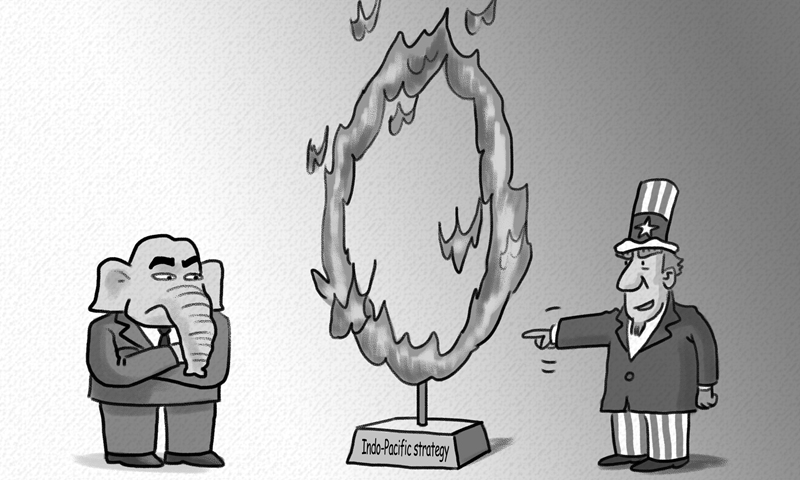
By Lu Xue
Illustration: Liu Rui/GT
The US Navy on Wednesday announced that it carried out a transit through India’s exclusive economic zone (EEZ) without requesting India’s prior consent. The US 7th Fleet said that it conducted “freedom of navigation” operations within India’s EEZ. “This freedom of navigation operation upheld the rights, freedoms, and lawful uses of the sea recognized in international law by challenging India’s excessive maritime claims,” said a statement by the US 7th Fleet Public Affairs.
To secure global hegemony and maintain the expansive operational scope of its navy, Washington has not ratified the United Nations Convention on the Law of the Sea yet. Under the banner of “freedom of navigation,” it is common for US warships to trespass into the territorial waters or EEZs of other countries, including China. This is evidently a kind of hegemonic practice. But since both Washington and New Delhi recently have promoted their ties and stepped up cooperation, including in the military, some analysts said their bilateral ties seem to have entered a honeymoon period.
Against this backdrop, it is unexpected to see Washington repeat such action toward New Delhi. The Times of India on Saturday reported it as being “a highly unusual move,” saying that “India and the US are having a rare moment of disagreement in their burgeoning defense ties.”
Long Xingchun, president of the Chengdu Institute of World Affairs, told the Global Times on Sunday that US Navy’s move and its corresponding rhetoric meant to deliver a clear message to India: Even though the US has boosted relations with India, the latter still cannot challenge or negate US “freedom of navigation” in the region, or US national interests.
Out of geopolitical causes, such as coping with the so-called threat from China, India has escalated collaboration with the US, but there are still many frictions between the two countries.
From the US perspective, just as Long said, the aim of its frequent wooing of India, especially in the aftermath of proposing its Indo-Pacific Strategy, is to urge India to coordinate with the US’ strategy and serve the national interests of the US, instead of India’s national interests. For India, it hopes to realize its goals more effectively, such as upgrading its international influence and status and playing a bigger role in regional affairs, by virtue of strengthening cooperation with the US.
New Delhi has always seen itself as a hegemon in the Indian Ocean area, vigilant toward Washington’s military presence and activities in the region. Yet in recent years, to cope with China’s rise, India has tended to become more tolerant toward US naval operations.
But the US has always attempted to maintain its global hegemony. Given the strategic position of the Indian Ocean, the US will not easily discard its hegemony there, nor will it tolerate any country to share the hegemony with it. This will lead to frictions in strategic interests between the two countries.
It is noticeable that the Indian government has not immediately responded to the US 7th Fleet’s transit or its statement. Instead, India conveyed its concern to Washington on Friday, two days after the US Navy’s transit. There are domestic voices in India arguing their country’s response was soft. For example, Subramanian Swamy, a member of Parliament in Rajya Sabha, the upper house of the Indian Parliament, on Saturday posted on Twitter that, “‘Concern’ is the language of those who have chickened. Between China and US, India is becoming ineligible for anything but a junior partner status just as Japan has been since 1945.”
An India netizen on Friday commented that “India gets the first real taste of joining up with the #Quad,” a US-led informal security grouping with Japan, Australia and India. With the US warship’s transit and its aggressive narrative, India needs to reevaluate its ties with the US, have a clearer awareness of this country and avoid any illusion toward this country. Historical experience tells us that the US is a country which can turn its back on any ally, let alone India, to pursue national interests.


Comment